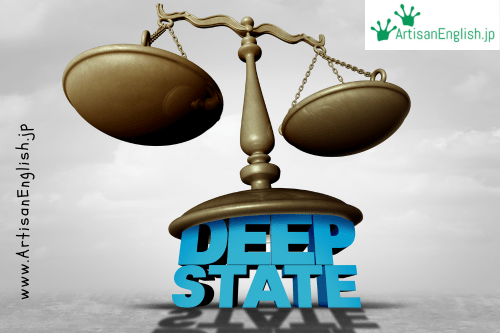
YouTube / iTunes / Spotify / Radio Public / Pocket Casts / Google Podcasts / Breaker / Overcast
Listen to ArtisanEnglish.jp posts & lesson intros here.
WotD: Deep state
OK, now we are going to take a walk into the world of American polarized politics and conspiracy theories.
You may have heard the term deep state in recent years, but unless you live in the US, you may not understand what it means and how it’s used in the context of the United States of America.
The deep state is a secretive and powerful network of individuals, including government officials, military officers, and corporate entities, believed to operate outside the democratic system, influencing policy and decision-making behind the scenes.
The concept suggests that a shadow unelected government, or a parallel power structure, is calling the shots instead of the official elected government.
The existence of a deep state implies a level of secrecy and manipulation that extends beyond the control of elected officials and the public.
The term deep state has become increasingly polarized, with some (Republicans) viewing it as a concern for unchecked power and others (Democrats) dismissing it as a conspiracy theory.
Supporters of the deep state theory argue it explains specific inexplicable actions and outcomes in politics and policy, serving as a convenient scapegoat for controversial or unpopular decisions.
On the other hand, critics argue that the concept is often used to delegitimize bureaucrats and government systems or justify baseless claims.
They assert that democratic institutions and checks and balances are sufficient to prevent the emergence of an all-powerful, hidden entity pulling the strings from the shadows.
In the United States, Republicans have said the deep state exists to prevent a legally elected president, Donald Trump, from making drastic changes to the way the government operates.
They say the deep state prevents Trump from taking the US out of NATO, for example, or from winning the 2020 election.
Flesch-Kincaid Readability Test
This post is understandable by a reader who has at least some college education.
On the Flesch-Kincaid reading-ease test, this post scores 38.
The easier a passage is to read, the higher the score on a scale of 0 – 100.

